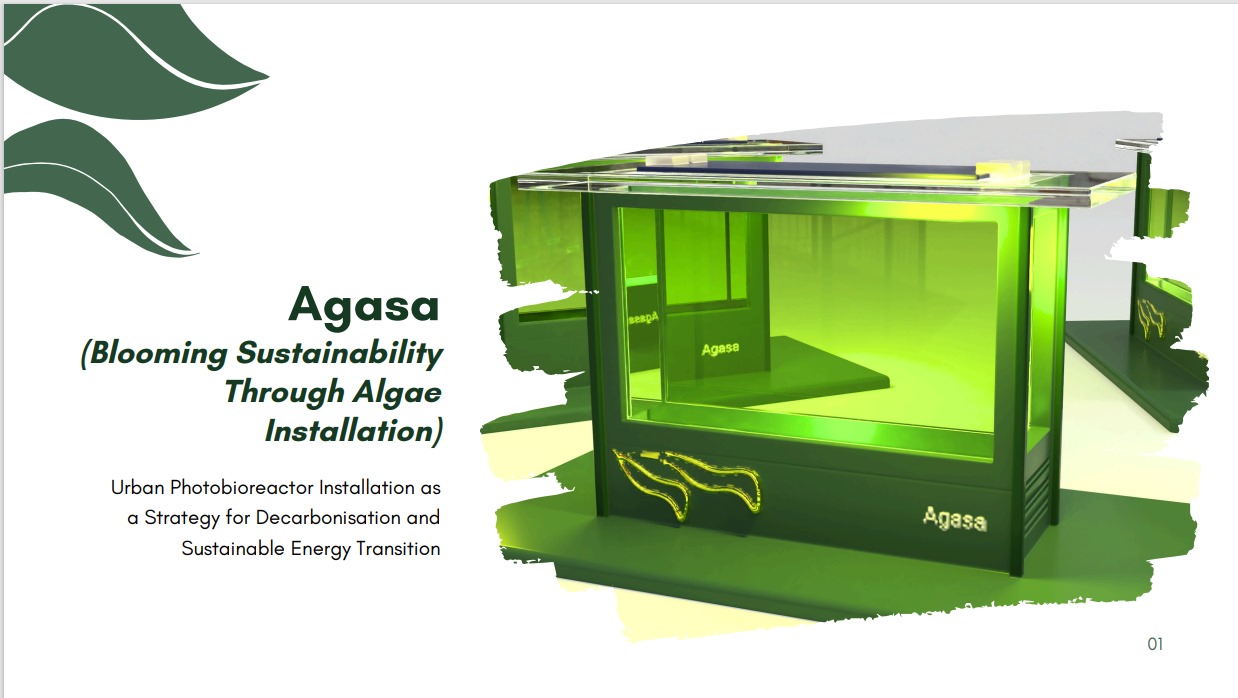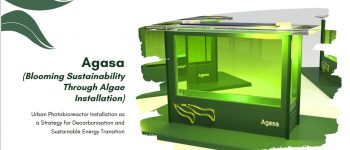AGASA (Algae for Sustainable Action) is an advanced photobioreactor system engineered to address the critical challenges of urban decarbonization and energy transition. As greenhouse gas emissions continue to rise in urban and industrial areas, traditional solutions such as tree planting are increasingly impractical due to land constraints. Additionally, renewable energy deployment remains suboptimal due to grid complexity, lack of direct economic benefits, and insufficient sectoral collaboration. AGASA presents an innovative alternative by leveraging the high carbon sequestration capability of microalgae, which can absorb CO₂ up to 50 times more efficiently than terrestrial plants while simultaneously producing oxygen and biomass for further utilization.
AGASA operates as an integrated system designed for seamless deployment in high-emission zones, such as industrial complexes and congested urban centers. The photobioreactor utilizes transparent, durable glass installations to cultivate microalgae, which continuously perform photosynthesis, capturing carbon dioxide and releasing oxygen into the environment. Unlike static tree-based carbon sinks, AGASA enables continuous biomass harvesting, making it a dynamic and scalable solution for sustainable carbon offsetting. The harvested algae biomass can be processed into biofuels, bioplastics, and other valuable bioproducts, contributing to a circular bioeconomy while reducing dependency on fossil-based materials.
One of AGASA’s key innovations is its integration with solar panels, enabling the system to generate renewable energy to power essential urban infrastructure such as street lighting, water pumps, and air purification units. This dual-functionality enhances its energy efficiency and economic viability, providing tangible benefits beyond carbon capture. Additionally, AGASA is equipped with IoT-enabled sensors and artificial intelligence (AI) to monitor air quality in real time, optimize algae growth conditions, and provide actionable environmental insights. The collected data can be utilized for research, policymaking, and industrial sustainability assessments, ensuring AGASA’s role as a multifaceted environmental management tool.
Designed for scalability, AGASA follows a modular architecture that allows flexible implementation in diverse urban and industrial settings. The system can be deployed as standalone units in high-pollution areas or integrated into existing urban infrastructure such as highways, office buildings, and public spaces. This adaptability ensures its applicability across various decarbonization initiatives, including government-led sustainability programs and private-sector carbon offset commitments.
AGASA’s business model is structured around B2G (Business-to-Government) and B2B (Business-to-Business) partnerships, targeting corporations, municipalities, and industrial stakeholders seeking cost-effective and high-impact decarbonization solutions. By offering an economically viable carbon sequestration alternative, AGASA aligns with global sustainability standards, including ESG compliance, net-zero commitments, and corporate social responsibility (CSR) programs. The project’s financial projections indicate strong market demand, with an anticipated penetration of 30% within its target market in the first year.
Through AGASA, we aim to redefine urban sustainability by transforming carbon emissions from a growing crisis into a resource for clean energy, environmental restoration, and economic growth. The system embodies an intersection of cutting-edge technology, scientific research, and practical business applications, making it a pioneering solution in the fight against climate change.
You can access our project description, presentation, and video through this link: https://intip.in/AgasaDF2050 . We would be more than happy and honored to present it directly at the event.
AGASA offers an innovative algae-based photobioreactor system designed to maximize carbon capture efficiency while generating valuable biomass. Installed in high-emission urban and industrial areas, AGASA photobioreactors leverage microalgae’s rapid growth and high CO₂ sequestration rates, absorbing atmospheric carbon at 50 times the efficiency of trees. The system releases oxygen while producing harvestable biomass for biofuels and bioproducts, contributing to a circular bioeconomy.
Integrated with solar panels, AGASA enhances urban energy sustainability by supplying renewable power to essential infrastructure like streetlights and water pumps. The system also incorporates AI and IoT for real-time air quality monitoring, optimizing CO₂ capture and ensuring data-driven environmental management.
Unlike traditional offset strategies, AGASA is designed for scalability and financial viability. Its business model focuses on B2G and B2B partnerships, offering cost-effective carbon reduction solutions for corporations, municipalities, and industries seeking to comply with net-zero targets. With modular deployment and low operational costs, AGASA provides an accessible, high-impact approach to accelerating urban decarbonization while creating economic value.



